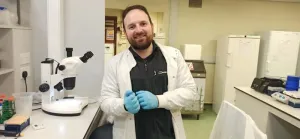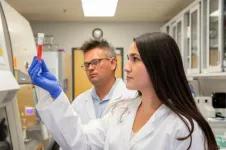Genes for learning and memory are 650 million years old, study shows
A team of scientists led by researchers from the University of Leicester have discovered that the genes required for learning, memory, aggression and other complex behaviors originated around 650 million years ago
2023-07-14
(Press-News.org) A team of scientists led by researchers from the University of Leicester have discovered that the genes required for learning, memory, aggression and other complex behaviours originated around 650 million years ago.
The findings led by Dr Roberto Feuda, from the Neurogenetic group in the Department of Genetics and Genome Biology and other colleagues from the University of Leicester and the University of Fribourg (Switzerland), have now been published in Nature Communications.
Dr Feuda said: “We’ve known for a long time that monoamines like serotonin, dopamine and adrenaline act as neuromodulators in the nervous system, playing a role in complex behaviour and functions like learning and memory, as well as processes such as sleep and feeding.
“However, less certain was the origin of the genes required for the production, detection, and degradation of these monoamines. Using the computational methods, we reconstructed the evolutionary history of these genes and show that most of the genes involved in monoamine production, modulation, and reception originated in the bilaterian stem group.
“This finding has profound implications on the evolutionary origin of complex behaviours such as those modulated by monoamines we observe in humans and other animals.”
The authors suggest that this new way to modulate neuronal circuits might have played a role in the Cambrian Explosion – known as the Big Bang - which gave rise to the largest diversification of life for most major animal groups alive today by providing flexibility of the neural circuits to facilitate the interaction with the environment.
Dr Feuda added: “This discovery will open new important research avenues that will clarify the origin of complex behaviours and if the same neurons modulate reward, addiction, aggression, feeding, and sleep.”
END
ELSE PRESS RELEASES FROM THIS DATE:
2023-07-14
UNIVERSITY PARK, Pa. — Monitoring dairy calves with precision technologies based on the “internet of things,” or IoT, leads to the earlier diagnosis of calf-killing bovine respiratory disease, according to a new study. The novel approach — a result of crosscutting collaboration by a team of researchers from Penn State, University of Kentucky and University of Vermont —will offer dairy producers an opportunity to improve the economies of their farms, according to researchers.
This ...
2023-07-14
An estimated 1,200 Americans, on average, are diagnosed with Lyme disease each day. Some of those patients continue to experience negative effects, even after treatment.
Lyme disease researcher Brandon Jutras, associate professor in the College of Agriculture and Life Sciences and affiliated faculty of the Fralin Life Sciences Institute, recently received a $2.7 million grant from the National Institute of Allergy and Infectious Diseases, part of the National Institutes of Health, to study what causes the disease to linger long after treatment.
“Using a series of sophisticated molecular techniques, in combination with both bacterial and host genetics, we’re working ...
2023-07-14
(Boston)—Noyan Gokce, MD, professor of medicine at Boston University Chobanian & Avedisian School of Medicine, has been awarded a $453,750 National Institutes of Health (NIH) R-21 grant for his research study “Impact of Per/Polyfluoroalkyl (PFAS) pollutants on vascular disease mechanisms.” This work will be performed in collaboration with co-investigator Jennifer Schlezinger, PhD from the Boston University School of Public Health.
Per- and polyfluoroalkyl substances (PFAS) are manmade chemicals that are extensively used in industrial and consumer products such as stain- and ...
2023-07-14
Professor Matt Rosseinsky, from the University’s Department of Chemistry and Materials Innovation Factory, has won the 2023 Eni Energy Frontiers Award for the digital design and discovery of next-generation energy materials.
A globally-prestigious prize for research in the fields of energy and environment, previous Eni Award winners include Nobel laureates such as Harold W. Kroto and Alan Heeger.
Professor Rosseinsky’s research is pushing new boundaries in how new energy materials are designed and discovered through the use of digital tools.
For the past 50 years, the scientific approach ...
2023-07-14
A study led by a Florida State University researcher that was published in Nature Human Behavior shows how colonization has contributed to the distribution of plants specimens stored in herbaria collections around the world.
Plant diversity in nature is generally highest in tropical regions around the equator, with decreasing diversity closer to the poles. FSU Department of Geography Assistant Professor Xiao Feng and Purdue University Assistant Professor Daniel Park showed that the plant specimens housed in herbaria in Europe and North America are more comprehensive and diverse than the collections housed in the countries ...
2023-07-14
INDIANAPOLIS – Regenstrief Institute’s Brian Dixon, PhD, MPA, and Shaun Grannis, M.D., M.S., have been elected as Fellows of the International Academy of Health Sciences Informatics. The organization is an honor society recognizing expertise in biomedical and health informatics around the world.
Election to membership is one of the highest honors in the field. Drs. Dixon and Grannis are two of 21 informatics leaders from around the globe elected to the International Academy in 2023.
In 2021, the two were members of a Regenstrief team whose work to support the public health response to the COVID-19 pandemic was recognized by the ...
2023-07-14
Due to the unclear distribution characteristics and causes of fluoride in groundwater of Mihe-Weihe River Basin (China), there is a higher risk for the future development and utilization of groundwater. Based on the systematic sampling and analysis, a team of researchers from Shandong University of Science and Technology studied the distribution features and enrichment mechanism for fluoride in groundwater by the graphic method, hydrogeochemical modeling, the proportionality factor between conventional ions and factor analysis.
Their analysis is published in the journal Frontiers of Environmental Science & Engineering ...
2023-07-14
In 2020, Japan performed the first successful test extracting cobalt crusts from the top of deep-sea mountains to mine cobalt—a mineral used in electric vehicle batteries. Not only do directly mined areas become less habitable for ocean animals, but mining also creates a plume of sediment that can spread through the surrounding water. An investigation on the environmental impact of this first test, published July 14th in the journal Current Biology, reports a decrease in ocean animals both in and around the mining zone.
The International ...
2023-07-14
Tucked into the hillsides of Italy, Portugal, and Spain, some of the world’s most famous—and most difficult to maintain—vineyards are heralded for their unique flavor profiles and centuries of tradition. But as extreme weather and changing socioeconomic conditions make this so-called “heroic viticulture” even more challenging, scientists worry these grapes and their cultural histories are at risk. In a Backstory publishing on July 14 in the journal iScience, researchers argue that farmers and scientists must work together to protect ...
2023-07-14
In the animal world, you don't need to learn a numeral system – such as the ten-digit Indo-Arabic system we commonly use – to be able to count. Animals constantly use numerical information from their environment to make decisions. Estimating the number of conspecifics in a competing group before engaging in conflict, the amount of food available in a difficult-to-reach location, or the number of potential sexual partners in a new territory is essential for survival and reproduction. This skill can reach an astonishing level of refinement; for example, certain species of ants orient themselves ...
LAST 30 PRESS RELEASES:
[Press-News.org] Genes for learning and memory are 650 million years old, study shows
A team of scientists led by researchers from the University of Leicester have discovered that the genes required for learning, memory, aggression and other complex behaviors originated around 650 million years ago








